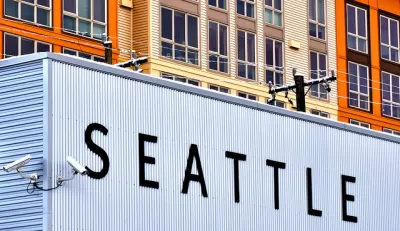Affordable housing advocates are pushing the city to use underutilized city owned property to build more housing, but it doesn't always pencil out.

The city of Seattle is sitting on 210 underutilized pieces of property that could be used for new affordable housing projects, advocates claim. Seattle Times reporter Bob Young writes that the city has looked into the potential developments, but has had difficulty making the math work. “Rents from affordable apartments would not cover the costs of developing and maintaining new buildings.”
Further, many of the sites identified by housing advocates are tied up with restrictions on uses or are just too small to accommodate the number of units that would make the development viable. Sharon Lee, executive director of the Low Income Housing Institute (LIHI), argues that the city's analysis presumes a 100 percent affordable housing development, and didn’t look at a potential mix of housing types.
Seattle Mayor Ed Murray’s staff is continuing to look at potential financing mechanisms for new housing development, including "linkage fees" on new development. A previous financing method, known as the Growth Fund, was eliminated in 2002 following the adoption of a law limiting property tax increases.
"Murray’s new development fee and his proposed inclusionary zoning — which requires new residential buildings to either include affordable units or pay a fee in lieu — are carrying out the goals of the old Growth Fund, but without using city tax revenues."
FULL STORY: Advocates push city of Seattle to use orphan properties for affordable housing

Alabama: Trump Terminates Settlements for Black Communities Harmed By Raw Sewage
Trump deemed the landmark civil rights agreement “illegal DEI and environmental justice policy.”

Study: Maui’s Plan to Convert Vacation Rentals to Long-Term Housing Could Cause Nearly $1 Billion Economic Loss
The plan would reduce visitor accommodation by 25% resulting in 1,900 jobs lost.

Planetizen Federal Action Tracker
A weekly monitor of how Trump’s orders and actions are impacting planners and planning in America.

Waymo Gets Permission to Map SF’s Market Street
If allowed to operate on the traffic-restricted street, Waymo’s autonomous taxis would have a leg up over ride-hailing competitors — and counter the city’s efforts to grow bike and pedestrian on the thoroughfare.

Parklet Symposium Highlights the Success of Shared Spaces
Parklets got a boost during the Covid-19 pandemic, when the concept was translated to outdoor dining programs that offered restaurants a lifeline during the shutdown.

Federal Homelessness Agency Places Entire Staff on Leave
The U.S. Interagency Council on Homelessness is the only federal agency dedicated to preventing and ending homelessness.
Urban Design for Planners 1: Software Tools
This six-course series explores essential urban design concepts using open source software and equips planners with the tools they need to participate fully in the urban design process.
Planning for Universal Design
Learn the tools for implementing Universal Design in planning regulations.
Caltrans
Smith Gee Studio
Institute for Housing and Urban Development Studies (IHS)
City of Grandview
Harvard GSD Executive Education
Toledo-Lucas County Plan Commissions
Salt Lake City
NYU Wagner Graduate School of Public Service



























